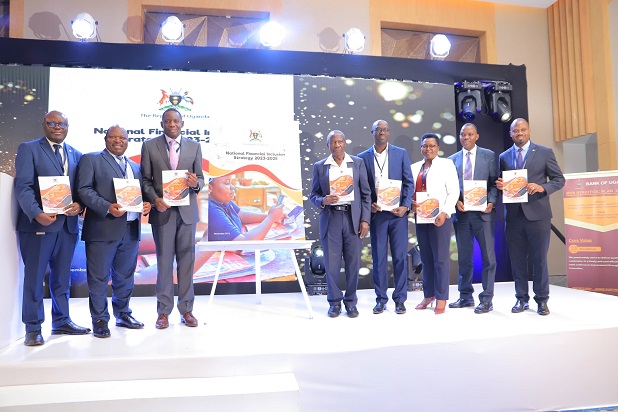Officials from BoU and the Ministry of Finance during the launch of the second National Financial Inclusion Strategy
The Bank of Uganda (BoU) Deputy Governor, Michael Atingi-Ego, has said while Uganda has made big progress in achieving financial inclusion, many Ugandans still lack access to essential financial tools.
“Much has been achieved through the first National Financial Inclusion Strategy, but our work is far from finished. Too many Ugandans still lack access to essential financial tools. Usage, not just access, must be our guiding star in the future,” Atingi-Ego said.
He made the remarks during the launch of the second National Financial Inclusion Strategy (NFIS II) 2023 – 2028 held at Four Points by Sheraton Hotel on 30 November 2023.
“We reaffirm our dedication to financial inclusion through the NFIS II (2023-2028), empowering individuals and driving economic growth via affordable, quality financial services,” he said, adding that NFIS II prioritises expanding access to savings, credit, insurance, remittance, pensions, investment, and Islamic banking products and services.
“By broadening access and lowering barriers, promoting digital and women-centred solutions, strengthening financial capability, and catalysing green investment, we can make financial services work better for all Ugandans – especially those still on the margins,” he said.
The NFIS stems from the Mexico Riviera Maya 2011 Declaration, where Uganda pledged to make measurable commitments towards financial inclusion, including implementing an NFIS.
Atingi-Ego said financial inclusion contributes to monetising the economy from agrarian subsistence, alleviating poverty, eradicating hunger, promoting health, and fostering gender equality.
“Together, guided by our collaborative first NFIS, we have broken down barriers and opened doors to transformative financial services for millions of Ugandans. New regulations have enabled agent banking to flourish, bringing banking services to villages. Government services can now be accessed digitally, thanks to e-verification and e-payment gateways,” ” he said, adding: “And landmark legislation like the National Payment Systems Act and the Security Interest in Movable Property Act have laid critical legal foundations. The results speak for themselves: financial access points per 100,000 adults have quadrupled, giving many Ugandans the tools to smoothen income and expenditure, build assets, and seize opportunities. The gender gap in account ownership has nearly vanished. And digital finance has taken off, empowering women in particular.”





